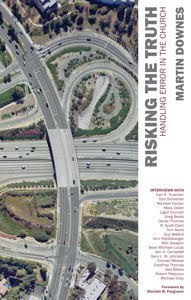Splitting Hairs?


Check out Martin's excellent book Risking the Truth.I want to offer some selective comments on a seminal New Testament passage concerning false teaching. That passage is 2 Corinthians 11:1-4 (ESV):
1. I wish you would bear with me in a little foolishness. Do bear with me!
2. For I feel a divine jealousy for you, since I betrothed you to one husband, to present you as a pure virgin to Christ.
3. But I am afraid that as the serpent deceived Eve by his cunning, your thoughts will be led astray from a sincere and pure devotion to Christ.
4. For if someone comes and proclaims another Jesus than the one we proclaimed, or if you receive a different spirit from the one you received, or if you accept a different gospel from the one you accepted, you put up with it readily enough.Several things should grab our attention:
1. The goal of the false teachers is to sever the intimate relationship between the true Christ and his bride, and not merely to exchange one set of ideas about God for another. It is vital that we view what is really at stake from Paul's perspective.
The loss is not merely intellectual but affectional, they have been led astray from a sincere and pure devotion to Christ. This is the burden of verses 2 and 3.
2. Both the origin of doctrinal error and the modus operandi of its preachers can be traced to the deception in the garden. We may speak of the original deception and all actual deceptions that proceed from it. This is the burden of verse 3, and verses 13-15.
3. The form that doctrinal error takes is to retain the right theological language but to substitute its content with alternative meanings. This is the burden of verse 4.
If we listen without discernement, we will assume that preachers who speak of Jesus, the Spirit and the gospel, are to be considered orthodox. But which Jesus, which Spirit, which gospel are they speaking of? That is Paul's concern
4. But there is also in these verses a damaging assessment made of the spiritual condition of the Corinthians. Paul's heart as a pastor is grieved by their tolerance of heresy:
For if someone comes and proclaims another Jesus than the one we proclaimed, or if you receive a different spirit from the one you received, or if you accept a different gospel from the one you accepted, you put up with it readily enough.
Did they really not know the difference between truth and serious theological error, between orthodoxy and heresy? It is a terrible thing to knowingly tolerate serious theological error. It is a reprehensible breaking of the first commandment. It is a sign of real spiritual trouble.
Wherever this is repeated, any pastor who shares some measure of Paul's concern for the truth of the gospel and for the good of souls cannot but feel great sadness and indignation at such a state of affairs.
He who has ears to hear, let him not listen to what the serpent is saying to the churches.




